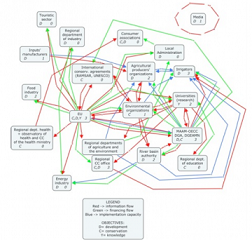Case-study /
Developing a social network map to frame adaptation action in the Guadiana river basin, Spain

Summary
The Guadiana river basin is expected to be one of the most seriously affected by climate change in Spain, with a decrease in water resources of 11% by 2030. This is very important if we consider that irrigated agriculture is a major socio-economic driver in this area. The decrease of water availability could have important social and economic consequences, and adaptation becomes crucial to overcome the effects of climate change.
Methodology
With the aim of analyzing the social and institutional framework and how climate change adaptation related decisions are taken in the Guadiana basin, in the agricultural and water sectors a social network mapping exercise was applied with a group of stakeholders, including representatives of the most relevant stakeholder groups in the basin for water and agriculture: the water administration (River Basin Authority, Upper Guadiana Consortium), representatives of some of the main irrigation communities, of some of the most active environmental groups and representatives of the different climate change offices involved in the basin (the National Climate Change Office, the Climate Change Office of Castilla la Mancha Region and the Climate Change Office of Extremadura region).
This social network mapping exercise was conducted in the context of the EC FP7 Mediation project.
The text is part of Deliverable 1.4: Visualization of institutional networks and the flows of information used for making adaptation decisions in a range of policy contexts and published in a paper here.
The full article summarises the results of a stakeholder workshop conducted by the Technical University of Madrid (UPM) in the Guadiana basin (Spain) aimed at visualising networks using the NetMap approach (Schiffer, 2010).
Schiffer, E., Hauck, J. 2010. Net-Map: Collecting Social Network Data and Facilitating Network Learning through Participatory Influence Network Mapping, Field Methods 22(3): 231-249.
